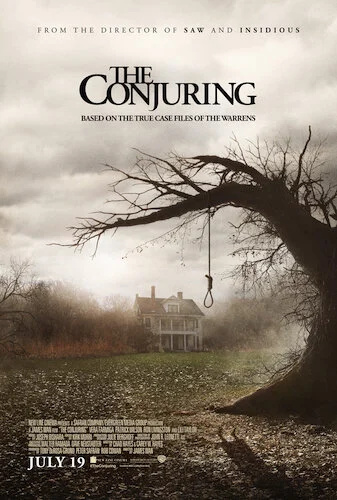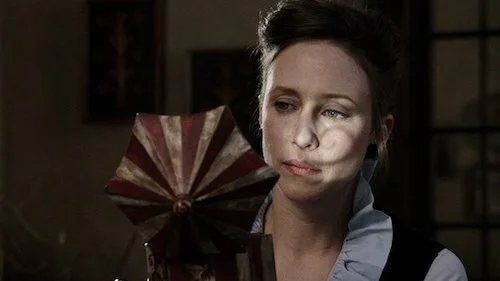The Conjuring: 31 Days of Horror
For all of October, we will review horror films. Submit your requests here, and you may see your picks selected!
Even though the Conjuring franchise has become stale (and I do mean beyond stale), it’s nice to go back to where the series first started: with James Wan’s original idea. Based on supposedly real cases of domestic haunting (I always take these claims with a grain of salt, as I don’t believe in ghosts or anything of that sort myself), The Conjuring sets itself up to be one of those Paranormal Activity or Blair Witch Project knock offs right away. However, it seems to go its own course. The scares happen pretty quickly, and they don’t let up. Not even once. The clever set up of having the haunting happen and the exposition laid out (in the form of two investigators detailing their line of work and this current case) helps The Conjuring in the long run. It doesn’t save everything for later like other horror films of its kind, and it doesn’t fully succumb to mindless scares throughout like the worst films of the genre.
These scares are fairly creative as well. It’s as if James Wan really wanted to let loose, and come up with imaginative thrills that were very different to Saw and its sequels (which, of course, are unique in their own twisted ways). What I believe to be one of the draws to the Conjuring franchise is the way that this series allows filmmakers to have one’s eyes play tricks on them. These include hard-to-see scares, or the smart integration of illusions. The Conjuring definitely feels like the starting point of all of this, and each scare escalates to bigger and scarier payoffs right until the end.
Lorraine Warren inspecting antiques.
Of course, this does make The Conjuring indebted to its scares just a little bit, clearly making this film one that’s more for the shocks than for the story (as “true” as it may be). However, that’s probably why The Conjuring was so marketable to begin with. If it focused on being the greatest film it could be, maybe there wouldn’t be a call for more. This is where being a critic becomes difficult, because who am I to say what improvements are necessary when these changes could stop a feature from being successful? Maybe the series wouldn’t have continued. This is great news for me, since I believe in quality over quantity. However, writing in retrospect means I have to be grateful of the win streak that’s supporting artists, no matter who they may be. Besides, it’s not like The Conjuring is bad. There are just hints of a film that’s more nuanced and narratively textured. At least it’s one hell of a fright compilation, if that’s what it ends up being in the long run, and there is at least a good attempt at making all of these horrors relevant to some sort of plot.
Andreas Babiolakis has a Masters degree in Film and Photography Preservation and Collections Management from Ryerson University, as well as a Bachelors degree in Cinema Studies from York University. His favourite times of year are the Criterion Collection flash sales and the annual Toronto International Film Festival.






